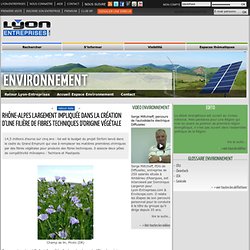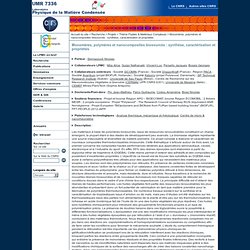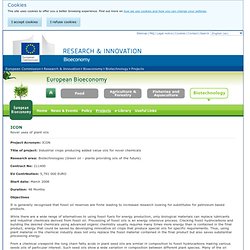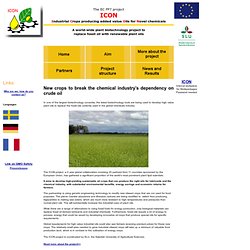

SINFONI. L'Etat booste les fibres techniques végétales. Sinfoni : Vers la structuration de la filière lin et chanvre – Actualités – Actualités – Limousin – Portail Régional de l'Innovation. Sinfoni: 14,5 millions d'euros pour remplacer les matières premières chimiques par des fibres végétales - Environnement. 14,5 millions d'euros sur cinq ans : tel est le budget du projet Sinfoni lancé dans le cadre du Grand Emprunt qui vise à remplacer les matières premières chimiques par des fibres végétales pour produire des fibres techniques.

Il associe deux pôles de compétitivité rhônalpins : Techtera et Plastipolis. Champ de lin, Photo (DR) Son nom de code est Sinfoni. Aux côtés d'autres structures de différentes régions françaises, deux pôles de compétitivité rhônalpins, Techtera et Plastipolis sont impliqués dans le développement d’une filière utilisant à la place de produits chimiques, des fibres techniques d’origine végétale, en l'occurrence le lin et chanvre.
Ce projet Sinfoni a été sélectionné dans le cadre des Investissements d’Avenir (ex-Grand Emprunt), au titre des Projets Structurants des Pôles de Compétitivité (sous le sigle quelque peu rébarbatif de : PSPC). Une fillière structurée et inovante Une matière première durable Un projet collectif Publiée le 27 juin 2012 par LARGERON Dominique. DELOR-JESTIN Florence. Florence Delors - Vernis biosourcés. Gfp2012.cermav.cnrs.fr/actes-GFP2012.pdf. UMR 7336 - Bio-résines éco-compatibles. Porteur : Sbirrazzuoli Nicolas Collaborateurs LPMC : Mija Alice, Guigo Nathanaël, Vincent Luc, Persello Jacques, Bossis Georges Collaborateurs extérieurs : Société SICOMIN (France) ; Société DragonKraft (France) ; Région PACA ; Société Avantium (projet BIOFUR, Hollande) ; Société Kebony (projet Polywood, Danemark) ; SP Technical Research Institute (Suède) ; Université de Sao Paulo (Brésil) ; Centre de Recherche sur les Macromolécules Végétales à Grenoble (CERMAV UPR CNRS 6301), Université de Messine (Italie) ; CEMEF Mines-ParisTech (Sophia Antipolis) Doctorants/Post-docs : Pin Jean-Mathieu, Falco Guillaume, Codou Amandine, Bosq Nicolas Soutiens financiers : Projet et bourse Région APO – BIOECOMAT, bourse Région ECOMOBIL ; 2 thèses MESR ; 2 projets européens : Projet "Polywood" ; The Research Council of Norway RCN (équivalent ANR Norvégienne ; Projet Européen "BIOpolymers and BIOfuels from FURan based building blocks" (BIOFUR), FP7-PEOPLE-2012-IAPP.

UMR 7336 - Pin Jean-Mathieu. UMR 7336 - Sbirrazzuoli Nicolas. Www.labo-paca.fr/Fichiers/085.pdf. ICON - Biotechnology - Research. Project Acronym: ICON Title of project: Industrial crops producing added value oils for novel chemicals Research area: Biotechnologies (Green oil - plants providing oils of the future) Contract No: 211400 EU Contribution: 5,791 000 EURO Start date: March 2008 Duration: 48 Months Objectives It is generally recognised that fossil oil reserves are finite leading to increased research looking for substitutes for petroleum based products.

While there are a wide range of alternatives to using fossil fuels for energy production, only biological materials can replace lubricants and industrial chemicals derived from fossil oil. From a chemical viewpoint the long chain fatty acids in plant seed oils are similar in composition to fossil hydrocarbons making various seeds oils of particular interest. This project aims at developing such added value oils in existing industrial oil crops mainly in form of various wax esters particularly suited for use in lubrication. Expected Impact Expected Results. Index. New crops to break the chemical industry’s dependency on crude oil In one of the largest biotechnology consortia, the latest biotechnology tools are being used to develop high value plant oils to replace the fossil oils currently used in the global chemicals industry.

The ICON project, a 4 year global collaboration involving 25 partners from 11 countries sponsored by the European Union, has gathered a significant proportion of the world’s most prominent plant lipid scientists. It aims to develop high-yielding sustainable oil crops that can produce the right oils for lubricants and the chemical industry, with substantial environmental benefits, energy savings and economic returns for farmers. The partnership is using genetic engineering technology to modify new oilseed crops that are not used for food purposes. While there are a range of alternatives to using fossil fuels for energy production, only biological materials can replace fossil oil derived lubricants and industrial chemicals. ANACOMPO. Sustainable biobased structural materials.